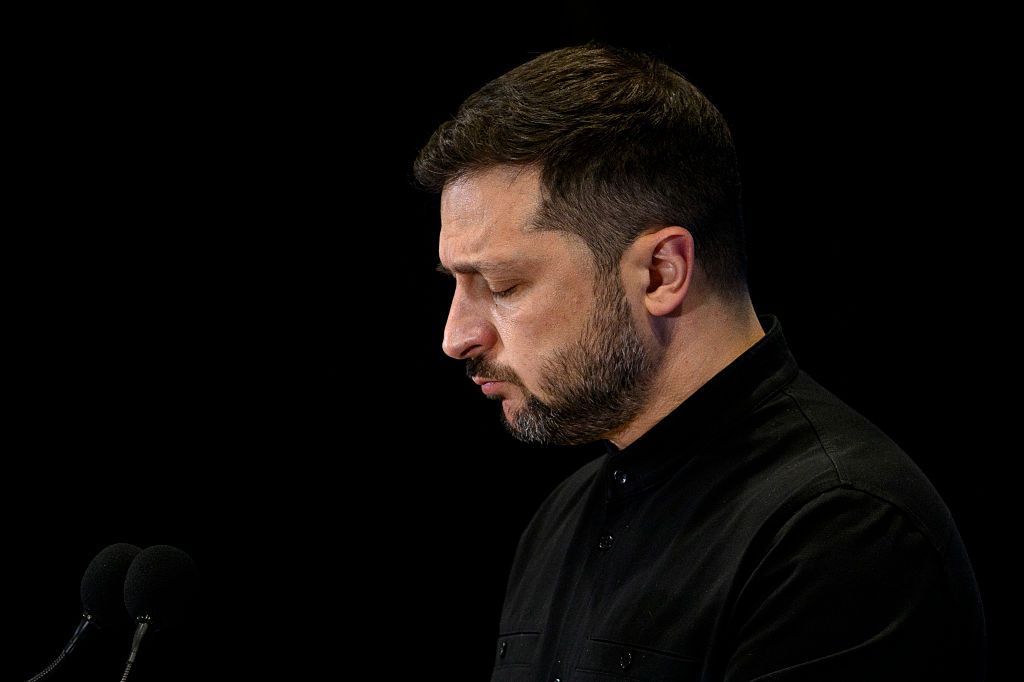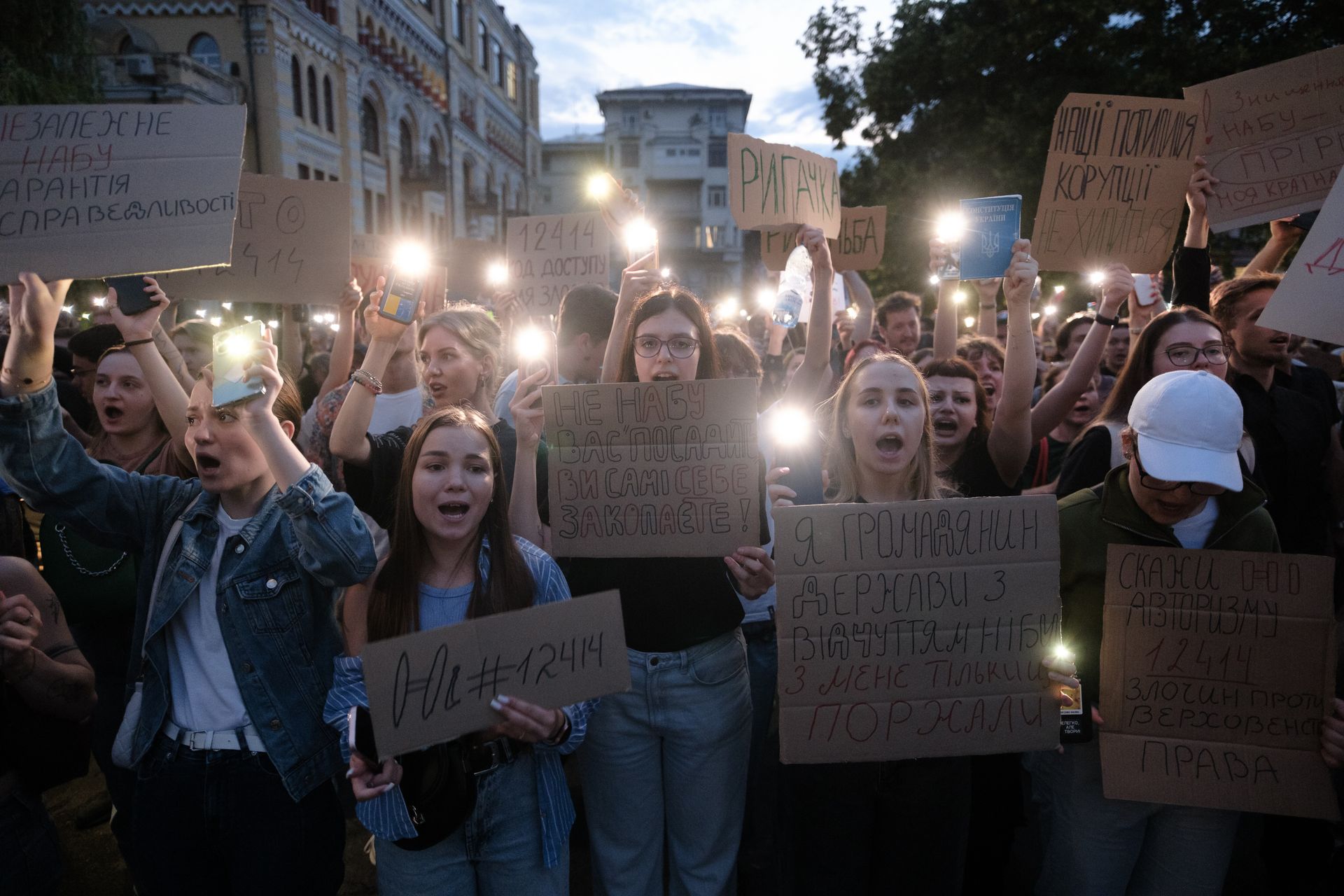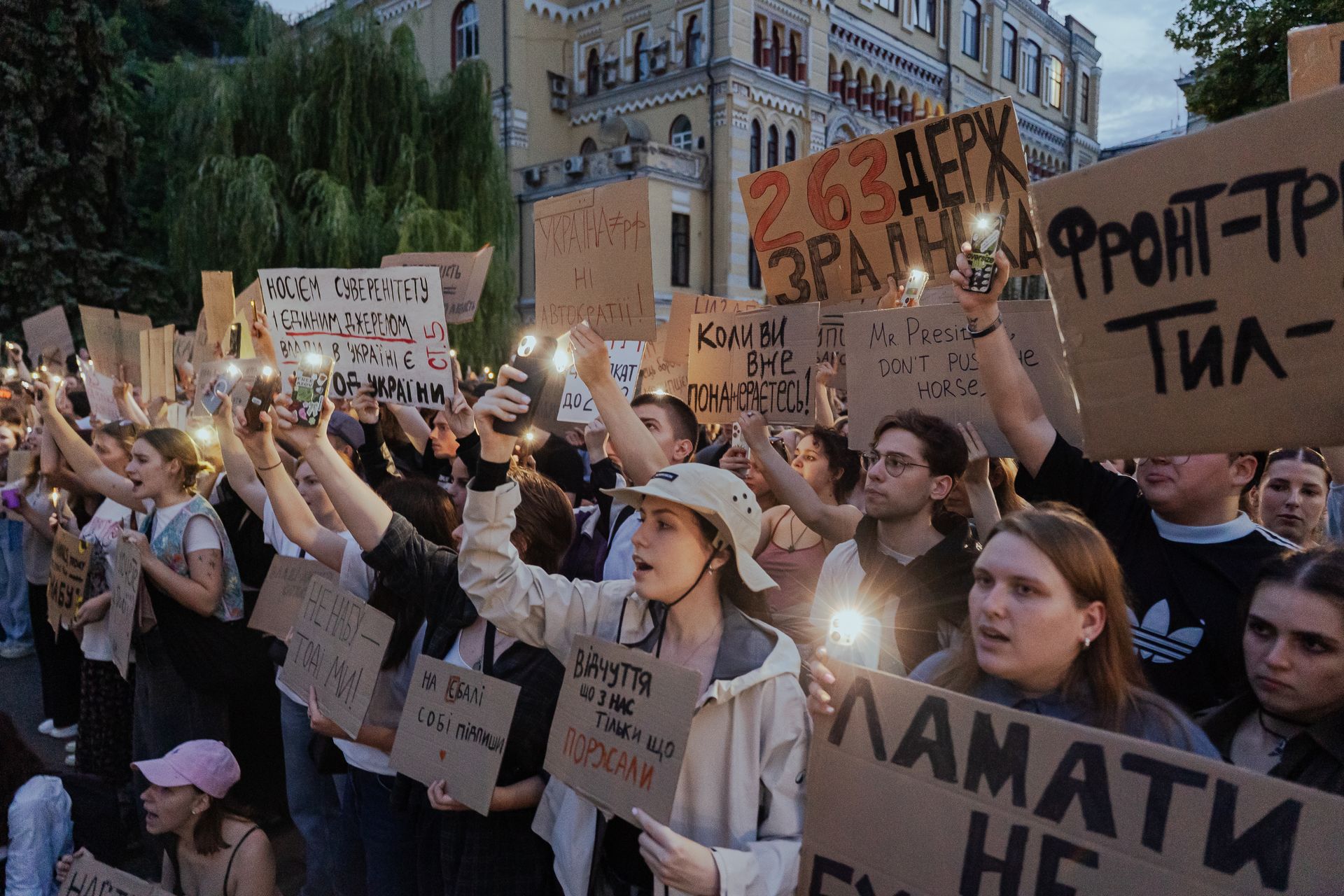Ukraine’s anti-corruption chief on how his agency became a target — and what’s next
As cases close in on powerful figures, Semen Kryvonos expects the campaign to dismantle his anti-corruption bureau to continue.

Director of the National Anti-Corruption Bureau of Ukraine Semen Kryvonos speaks during an interview in Kyiv, Ukraine on Aug. 14, 2025. (Viacheslav Ratynskyi / The Kyiv Independent)
Semen Kryvonos, head of the National Anti-Corruption Bureau of Ukraine (NABU), is stuck between a rock and a hard place.
On one side, there's mounting pressure on the bureau to deliver results, especially in exposing high-level corruption — including in the secretive and ever-expanding defense sector. On the other hand, Kryvonos must constantly defend his agency from attacks — including from other law enforcement agencies, whose loyalties lie with the president's office.
Among them, the all-powerful Security Service of Ukraine is a particularly perilous threat.
In July, NABU narrowly escaped a government-led power grab that sought to strip the agency of its independence. It was public outrage and spontaneous street protests that were among the key factors that forced the authorities to back down, and reestablish, at least for now, the bureau's autonomy.
It won't be the last attempt to put pressure on the agency, Kryvonos told the Kyiv Independent in an exclusive interview. The only defense, he believes, is showing the bureau’s worth.
"Looking back at those events, we understand that the interests of many groups converged — politicians, government, and even those calling themselves the opposition," Kryvonos said.
"And all those interests somehow came together at one point. You saw the open joy in parliament when they voted (to dismantle the bureau’s independence). I haven't seen anything like that in a long time."
The fallout was significant. The attempted takeover left deep scars in NABU's already fragile relationship with the rest of Ukraine's law enforcement apparatus — much of which operates under heavy political influence.

As part of the move to subvert NABU, the Security Service conducted dozens of searches and targeted several NABU detectives on a variety of accusations. (The service has subsequently denied it was acting in coordination with the legislative move to take over NABU).
The raids were allegedly brutal: Security Service agents used excessive force against the bureau's detectives during searches, according to Kryvonos.
"In our opinion, there are indeed elements of crime there," Kryvonos said, adding that his detectives reported the Security Service's conduct to the police, and investigations were ongoing.
But a bigger problem for the bureau is the gravity of some of the accusations. Two high-ranking NABU detectives stand accused of high treason and have been behind bars for a month now.
Security Service Head Vasyl Maliuk has publicly accused them of Russian ties but provided scant evidence.
The SBU chief said that one of the detained detectives, Ruslan Magomedrassulov, was helping his parents sell hemp to Russia's Dagestan republic. That, to the Security Service, qualified him as a high treason suspect.
To support the claims, the service published alleged intercepted phone conversations of the detective. However, the tapes don’t mention Russia’s Dagestan; instead, they mention Uzbekistan, an independent country in Central Asia.
A week later, the Security Service published a new batch of private conversations they say belong to Magomedrassulov, allegedly showing that his father indeed had been doing business with Dagestan.
A second detective stands accused of leaking information to Russia through a former Ukrainian official wanted for treason. The detective’s defense says he had been in contact with the official before he allegedly switched sides.
Kryvonos finds the known evidence against his detectives unconvincing. Freeing them from the Security Service's detention is a priority for the bureau, which seems to regard them almost as hostages. Kryvonos said he spoke to the president about it.
According to Ukrainian lawmakers — both from the governing Servant of the People faction and the opposition — the attack on Ukraine's anti-corruption institutions was coordinated by the president's office, and tied to the high-profile cases that the bureau was investigating.
The lawmakers spoke on condition of anonymity to be able to express their thoughts freely on the contentious topic.
The president’s office did not comment in time for publication.
President Volodymyr Zelensky publicly justified the signing of the law that stripped anti-corruption agencies of their independence as the need to "counter Russian influence." He then backed the restoration of the agencies' independence following mass protests.
Kryvonos is still trying to play it safe — even after his agency withstood the attack in July, he is hesitant to blame anyone directly. During the interview with the Kyiv Independent, he refused to name the organizers of the attack. He also didn't go into details about high-profile cases that the bureau is investigating.
"We are not hiding anything," Kryvonos said after the question about high-profile cases came up in the interview for the second time.
"At the pre-trial stage, before charges are made, we cannot speak publicly about the alleged crime," he added. "So yes, it often looks as though we are hiding information, but that's not the case."

Security Service Chief Maliuk doesn’t seem to share the concerns about the sensitivity of ongoing investigations. In a recent TV interview, Maliuk said he called Kryvonos and asked him whether Magomedrassulov was indeed involved in a pre-trial investigation of a case "involving a businessman everyone is talking about."
He was referring to Timur Mindich, President Zelensky's longtime friend and former business partner. Prior, Ukrainian media had reported that the detective targeted by the Security Service had been working on the case.
Maliuk said the bureau chief assured him that he wasn't.
Kryvonos said that was the only answer he could give without harming the case — and he clearly wasn’t happy that his counterpart shared it on TV.
"What would Maliuk answer if I asked him about the participation of a specific Security Service employee in the Spiderweb operation before its completion? Obviously, he would deny such participation, as well as the operation itself, regardless of whether it was true or not," Kryvonos clapped back.
Despite the tense relationship, NABU is still reliant on the Security Service in its investigations.
"We still do not have independent wiretapping capabilities. We still use the technical facilities of the Security Service. If we place a target under surveillance and receive the appropriate court order to wiretap someone, the Security Service knows the phone number and the subject under surveillance," Kryvonos said.
The bureau also relies on the Security Service for expert evaluations within its investigations.
"In almost every other proceeding, we have to turn to expert institutions affiliated with the Justice Ministry or the Security Service and ask them to calculate the amount of damages, to put it simply. Of course, these institutions are politically dependent," Kryvonos added.
High-profile cases at stake
The Security Service chief’s attempt to show that the NABU detective in custody was not investigating Zelensky’s friend came in response to the widespread suspicions that the case was among the motives for curbing the bureau’s independence.
Lawmakers and officials who spoke with the Kyiv Independent agreed that the case involving Mindich could have triggered the government's attack on anti-corruption institutions.
"I cannot comment, neither confirm nor deny any names until, if a crime exists, it is proven," Kryvonos pushed back.
The other two high-profile cases that could have provoked the attack on NABU involve former Deputy Prime Minister Oleksii Chernyshov, also a friend of Zelensky, and Rostyslav Shurma, former deputy head of the president's office.
According to Ukrainska Pravda, searches were conducted in Shurma's Munich apartment in July as part of the NABU investigation into him, only days before the attempted de facto takeover of the bureau.
A month prior, Chernyshov became the highest-ranking official in Ukraine's history to face corruption charges while in office. He is suspected of abusing his government post to illegally enrich himself through a large-scale land grab.
Chernyshov was outside of the country when it became obvious that he would be charged, on a conveniently long work trip and sparking suspicions that he was fleeing.
Chernyshov returned to Ukraine soon after, and was charged.
In need of results
Kryvonos, who has led the country's top anti-corruption agency for over two years, has been tight-lipped on ongoing cases, complicating one of his main goals — showing the people that the bureau is on track to deliver results.
He says he understands the frustration people have with the lack of convictions, even when the evidence is public and appears convincing.
"Our job is to expose the crime and send the case to court for a conviction or acquittal. If you ask me, I certainly do not think it is normal or acceptable that the case of the former head of the State Fiscal Service, for example, has been in court for six years, or that other cases are stuck in court for six years," Kryvonos said, referring to high-profile cases that die in court.
Kryvonos says it harms the reputation of the agency, which is often blamed for not delivering, even though it gathers sufficient evidence.
This process needs to drastically improve if Ukraine wants to safeguard the growing defense sector, prone to corruption risks.
"As of today, there are more than 70 investigations in the defense sector," Kryvonos said.
"These are cases where the losses amount to hundreds of millions of hryvnias, involving intermediary companies and a large number of countries. These cases require enormous effort, a lot of time, and a great deal of focus and expertise from our detectives."
"We also have to understand that defense procurement is sensitive, and many of these procurements are classified due to national security and defense needs," he added.
Days after the NABU's independence was restored in late July, the bureau revealed a scheme involving inflated state contracts for drones and electronic warfare equipment, signed in 2024 and 2025.
Kryvonos said the timing of the revelation was a coincidence, and not due to the bureau trying to show flashy results in response to the pressure campaign.
According to investigators, officials involved in the scheme allegedly received up to 30% of contract funds as kickbacks.
Oleksii Kuznetsov, lawmaker from Zelensky’s Servant of the People party, and former Luhansk Oblast Governor Serhii Haidai were arrested as part of the scheme.
Ending the interview, the Kyiv Independent asked the bureau's chief for his opinion about the future of the anti-corruption institutions in Ukraine and whether he will be able to continue his work despite pressure that seemingly comes from all sides.
Kryvonos said he expects the attacks to continue. This time, he expects them to focus on himself — to undermine the bureau by changing its leadership.












